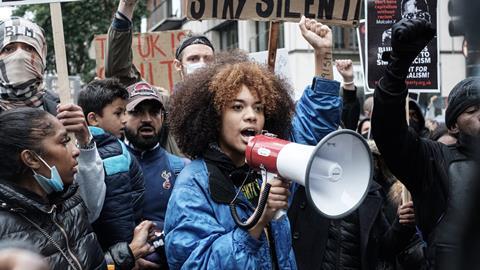As we approach a new year, we must continue to talk about these important issues. Clare Williams, apologist and founder of Get Real shares her thoughts about how Christians should respond to racial injustice
The first thing I’d say to a young black person in the throes of racial injustice is that I’m really sorry you’re facing whatever situation you might be facing. I know what that’s like myself. I know what it’s like to have tried to do everything you’re supposed to do - get your education, love the Lord, but then to still encounter racial injustice.
I was travelling somewhere recently and was frisked at the airport on the way there and ‘randomly’ stopped on the way back. That is a common thing and it fills me with dread every time I go to airport security. Even though you’ve done all the right things, to still be seen as a suspect, there’s something about it that is eroding, undermining and makes you feel horrible.
I’m really sorry you’re having to deal with those things, but please don’t trade in your faith. The very fact that we believe we have inherent human dignity, that we are made in the image of God, or the very fact that we get angry about being treated badly, points us to a God who has made us in his image with dignity.
If we are just a bag of atoms and we decide our value for ourselves, then when people decide I’m not worthy of dignity because I’m a black woman, what have I got to say about that? However, if there is an objective standard, which resides in God himself, for what we are worth as human beings, then that actually points me towards God, not away from him. My anger, my upset, all the hurt I feel actually points me to a God who doesn’t just make my human dignity possible, but actually cares deeply about it.
Get access to exclusive bonus content & updates: register & sign up to the Premier Unbelievable? newsletter!
The Church’s response
Christians must ACT in response to racial injustice:
A - Affirm. Don’t just listen, actually affirm black pain. There are things that no matter how educated I am, I will still have to face, regardless. Affirm that there are some things that are going to be different about my life experience to maybe my Christian white friends and brothers and sisters.
C - Challenge and be ready to be challenged. It is confronting to have these conversations. I remember doing an unconscious bias test a few years ago and I was shocked to know what biases I had. I had to take that to the Lord and ask God to change me. That’s part of my sanctification process. Be prepared to be challenged and for uncomfortable conversations.
T - Theology matters. Respond in the knowledge that we are all made in the image of God and that’s where our dignity and value comes from. But the gospel isn’t just a bed of roses, it’s there to confront us where we fall short. And maybe sometimes where we fall short is that we have biases against people who don’t look the same as us. When we are confronted with that, sometimes that anger, that reaction is actually the Holy Spirit convicting us deeply and saying: “You’ve got an issue here, you need to change.”
This is taken from a longer interview Ruth Jackson did with Clare Williams on Unapologetic. You can hear the podcast series here.























